On the political front, Nigeria’s government continues to reassure its citizens over the health of President Muhammadu Buhari, but confirmed that he spends most of his time working from home. A statement from the President’s office late on Thursday responded to concerns after the head of one of Africa’s largest economies missed a meeting of the Federal Executive Council.
The 74-year-old Buhari earlier this year alarmed Nigerians when he was absent from office for 6 weeks, undergoing medical treatment and assessment in London, though few details have emerged of what medical issues he is confronting, leading to some calls for him to be replaced by his Deputy.
Buhari returned to work in mid-March and his office announced that “as eager as he is to be up and about, the President’s doctors have advised on his taking things slowly”, though it also reinforced that Buhari remains in charge
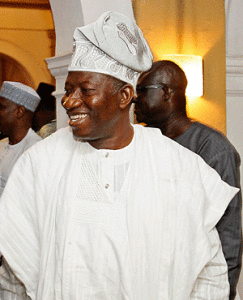
In an effort to defend his record, former President Goodluck Jonathan has blamed then-US President Barack Obama for his 2015 presidential election defeat to Buhari, alleging the former US president headed a “global conspiracy” to get rid of him.
Jonathan made the allegations in the recently published book “Against the run of play” which documents how he became the first Nigerian incumbent head of state to lose an election. He said then-President Obama and his officials “made it very clear to me by their actions that they wanted a change of government in Nigeria and were ready to do anything to achieve that purpose”.
“They even brought some naval ships into the Gulf of Guinea in the days preceding the election,” he was quoted as saying in the book written by journalist Olusegun Adeniyi. Unusually for African (and especially Nigerian) politics, Jonathan won widespread praise when he conceded to Buhari shortly before the final results were announced, preventing deadly violence that has blighted previous elections in Africa’s most populous nation.
But Jonathon also alleged that Obama had influenced Britain’s former prime minister David Cameron and the current French president Francois Hollande to work against him. “I got on well with Cameron but at some point, I noticed that the Americans were putting pressure on him and he had to join them against me,” he claimed. “But I didn’t realise how far President Obama was prepared to go to remove me until France caved in to the pressure from America.”
Jonathan said he had had a good relationship with Hollande, as his first point of contact whenever there were difficulties with neighbouring Cameroon over the Boko Haram insurgency, and in the wake of the 2014 kidnapping of more than 200 schoolgirls from the northeast Nigerian town of Chibok, Hollande had organised a security summit in Paris involving Nigeria and its neighbours, talks which were seen as instrumental in creating a regional fighting force, which has been seen as the key to weakening the Islamic State’s West Africa affiliate.
“But weeks to the election, (Hollande) had also joined the Americans in supporting the opposition against me”
Jonathan also attributed opposition to his re-election to claims by Buhari’s All Progressives Congress (APC) party that he was not doing enough to fight corruption. “That was the same thing I kept hearing from the Americans without specific allegations,” though rejecting the claims that he had done nothing to tackle the corruption problem.
Since coming to office, President Buhari has accused Jonathan and his Peoples Democratic Party (PDP) of leaving the Nigerian government with a “virtually empty” treasury and said “mind-boggling” amounts of public money had been stolen. As a consequence, many senior figures in the PDP and in Jonathan’s administration, as well as some of his family members, are currently under investigation, and facing trial for corruption.
Buhari, a former General who led a military government in the 1980s, has been successful in security operations against Boko Haram, where the insurgency has left at least 20 000 people dead in Nigeria alone, in contrast to Jonathan’s administration, which was often accused of failing to properly equip and support the military against Boko Haram Jonathan redirected the blame for this failure towards the US Administration, with Nigeria’s ambassador to Washington in 2014 publicly criticising the United States for refusing to sell it attack helicopters on what the Nigerians considered to be shaky human rights grounds, leading Jonathan to claim that US laws prohibiting arms sales to countries with poor rights records “made the war against Boko Haram very difficult”.
In response, a senior US Embassy official in Abuja issued a statement announcing the Embassy’s surprise that Jonathan appeared to be reconsidering his view of the election, as Washington’s policy before the vote had been consistently in support of a free, fair and transparent process, adding that the United States believed the result was “an expression of the will of the Nigerian people”.
This view was also echoed by Britain, whose Government called the vote “a credit to the Nigerian people and a truly historic moment for Nigerian democracy”, while pointing to the assessment of independent observers, including the European Union, that there was “no evidence of systemic manipulation of the process”.
Meanwhile, one of Nigeria’s most prominent Muslim leaders, the Emir of Kano, Muhammadu Sanusi ll, is under investigation on suspicion of embezzlement, fueling rumours that some officials in Government want him removed, following a series of comments he has recently made about the need for social reforms.
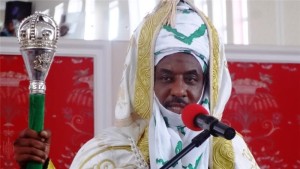
Anti-corruption investigators are examining the accounts of the Emir, following allegations of gross mismanagement of royal finances. “We have gone far in the investigation… to safeguard the honour and prestige of the emirate council,” according to the head of the anti-corruption unit in the northern state of Kano, Muhyi Magaji, leading to the treasurer and secretary of the state-funded Royal court being summoned for questioning in Kano.
The probe appears to be focussed on the use of $19m of palace funds allegedly used to pay for luxury cars, chartered flights, phone and internet bills as well as other personal expenses. As expected, the council has denied the allegations.
“The emirate council has never bought a Rolls Royce for the emir,” treasurer Mahe Bashir Wali announced. “These cars were given as gifts by his friends after he became emir.” Wali maintained that the emir always bought his airline tickets with personal money and that the state government approved all his spending
The Emir, who is revered in Nigeria’s Muslim-majority north and whose guidance is sought in spiritual and temporal matters, was appointed in June 2014 after the death of his predecessor, Ado Bayero.
In the three years since his appointment, the Western-educated ruler has broken with royal tradition, speaking out about the need for social reform in a fiercely conservative region. To some extent, that is unsurprising, because in his previous job as governor of the Central Bank of Nigeria, Sanusi Lamido Sanusi, as he was then known, caused shockwaves by alleging a $20bn fraud at the state-run oil company.
In response, then-President Goodluck Jonathan suspended the trained economist and banker from his position as Governor of the Central Bank, in what many saw as politically motivated retribution.
Since becoming Emir, Sanusi has said that men without sufficient means should not take more than one wife, prompting protests from clerics and residents in a city where polygamy is deeply entrenched. He has also hit out at the federal government’s economic policies, saying they have led to poor governance and lack of development in the north, setting him on a collision course with the authorities in both Abuja and Kano.
More recently, he publicly criticised the governor of the neighbouring state of Zamfara, who had blamed “divine retribution” and “fornication” for a mass outbreak of meningitis that to date has killed more than 800 people in the north.
In retaliation for the Emir’s criticism, Zamfara senator Kabiru Marafa accused Sanusi of “derailing from the tradition laid down by the former occupants of the throne he is sitting upon now. He is no longer a whistleblower or a university lecturer”, though Sanusi’s supporters reject the assertion. “Telling truth to power is in his blood, it runs in his lineage and nothing can make him change,” one of the emir’s aides said.
One Kano based anti-corruption activist declared that “this is raw politics and nothing more. The emir has come out bluntly and told truth to power… (and) the state government is using the anti-corruption commission to disgrace him.”
The Kano Emirate dates back more than 1 000 years, during which time it has developed norms and etiquette to which every emir is expected to adhere. That includes maintaining a dignified silence and avoiding open confrontation with political leaders, instead cultivating them in private for the greater public good.
The appointment of traditional rulers in Nigeria is agreed by a committee of “kingmakers” and subject to the ratification of the State governor, who also reserves the right to remove them from office.
Sanusi’s grandfather, Sir Muhammad Sanusi, also seen to be a modernizing influence, found himself in a similar situation in 1963, after nine years as emir, where he wielded power as one of Kano’s most charismatic emirs but was forced to abdicate, allegedly for embezzling tax funds and insubordination to political authority, though his removal was seen as retribution for his refusal to accord the regional government of the time the respect it felt it deserved
Emir Sanusi ll has yet to make any comment on the claims
Separately, Biafran pro-independence political activist leader Nnamdi Kanu, detained in October 2015 and held on charges of “criminal conspiracy, intimidation and membership of an illegal organisation” was released from custody in late April, 18 months after first being arrested, despite repeated court rulings in the interim granting him bail ignored by the government. The Nigerian government had previously refused to release Kanu on bail, despite court rulings from at least three judges, including a regional tribunal of the West African bloc Ecowas.
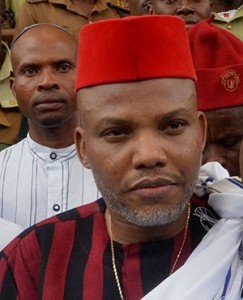
Kanu, who heads the Indigenous People of Biafra (IPOB) movement and runs the London-based Radio Biafra, is facing a series of charges, including treason, along with three other defendants.
A judge at the Federal High Court in Abuja granted him bail on health grounds, to enable him to get medical attention ahead of any trial. Kanu’s release was ordered just weeks before the 50th anniversary, on May 30, of the declaration of an independent republic of Biafra in southeast Nigeria, which sparked a brutal, nearly three-year civil war during which more than one million people, mostly Igbos, the dominant ethnic group in the southeast, died.
Kanu had been held at Kuje prison outside Abuja since his arrest in October 2015, and reportedly he had to provide sureties of around USD1 million before his release. He was also ordered not to attend any rallies, participate in any assembly of more than 10 people, or give any interviews while on bail.
One consequence of Kanu’s arrest and continued detention has seen separatist sentiment among Igbos in southeast Nigeria grow, and has sparked bloody clashes with the Nigerian security forces.
On the military front, Nigeria’s Army stated that at least 15 gunmen believed to be Boko Haram Islamic extremists were killed in late April, during a battle with Nigerian soldiers, with an undetermined number of insurgents also wounded in the fighting.
Defence spokesman Kinsley Samuel released an official statement confirming that the fighting occurred when extremists attacked a military base in the Sambisa forest in northern Nigeria, which had been a Boko Haram stronghold until the government declared, in late 2016, that the group had been “crushed”. Despite such recurring claims, Boko Haram fighters continue to carry out suicide bombings and other attacks in northern Nigeria and the Lake Chad region, including against well defended troop locations.
This action came only days after at least 5 Nigerian soldiers had been killed, with up to 40 injured, when a Boko Haram jihadist rammed an explosives-laden pick-up truck into a military convoy, also in northeast Nigeria
The suicide bomber, believed to be loyal to factional leader Abu Mus’ab Al-Barnawi, targeted the military convoy as it was conducting what were described as clearing operations between Yobe and Borno states. The convoy was heading to the garrison town of Damboa, located about 90km from the Borno state capital, Maiduguri, at the time it was attacked.
There has been a spate of deadly attacks on military targets in recent months, as Nigerian troops fight to end the eight-year insurgency which has spilled into neighbouring countries Cameroon, Chad and Niger, rendering more than two million people homeless.
Most of the recent attacks are suspected to have been carried out by the Al-Barnawi faction, which is now backed by the Islamic State group. In late 2016, ISIS declared Abu Mus’ab Al-Barnawi, whose father founded Boko Haram, as the group’s new leader, replacing its long-time figurehead Abubakar Shekau, though Shekau has rejected Abu Mus’ab Al-Barnawi’s leadership and has maintained he remains in charge, leading to a split in Boko Haram ranks and severe infighting between the opposing factions.
While Shekau’s faction focuses mainly on hit-and-run raids on villages and attacks on civilian targets, Al-Barnawi’s faction is focused on attacks on the military.
Nigeria’s government continues to maintain that Boko Haram is a spent force, and in disarray, despite the continuing attacks and an increase in suicide bombings targeting security checkpoints, mosques and camps for the displaced.
On the economic front, and focused on the Niger Delta region, Nigeria’s Petroleum Minister Emmanuel Ibe Kachikwu claims that Nigeria lost between $50bn and $100bn in oil revenues to militant attacks on installations during 2016, with production having been cut to 1.2 million barrels a day – a loss of around 1 million barrels a day.
The Minister announced a 20-point plan to end the decades of insurgency through investment in social and infrastructure development in the oil-rich Niger Delta. In response, Delta militants claim that careless oil production has impoverished residents by destroying agriculture and fishing grounds.
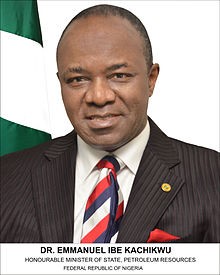 The Minister promised to work with state governments, communities and multinational oil companies to bring oil business opportunities, including the construction of oil refineries, to residents of the southern oil-producing states.
The Minister promised to work with state governments, communities and multinational oil companies to bring oil business opportunities, including the construction of oil refineries, to residents of the southern oil-producing states.
“Nothing is as sad for people who produce resources to not have access to those resource opportunities,” the Minister announced, while stressing “the need to pull people from militancy and put them back into schools.” But he also said that the government, operating on a budget strained by low international oil prices and suffering its worst recession in 25 years, cannot continue a 2009 federal amnesty program which pays up to 30 000 former militants to cease their resistance to the Government and to protect the very installations they once attacked.
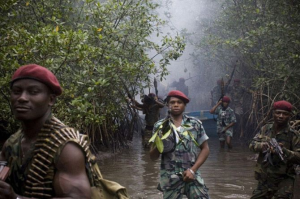
The Minister noted that halting the militancy in the Delta region has “defeated every regime, (being) a problem that seems to be intractable, seems to be never-ending”, but he reaffirmed that the Buhari government remains dedicated to resolving it, while the militants continue to demand action in place of months of talks that appear to them to be going nowhere.
Former militant leader Pastor Nature Dumale Kieghe was quoted as saying “the 20-point agenda is a welcome development, but it is high time the Nigerian government backs up its talk with action … not mere talks without actions that have being going on for donkeys years”.
The Nigerian Government wants Royal Dutch Shell to reopen one of its main pipelines but the oil multinational is resisting, analysts say, for fear it could once again be bombed by militants.
The Nigerian Petroleum Development Company (NPDC) operated Trans Forcados Pipeline, the main feed to the 400 000-barrel-a-day Forcados export terminal, has been shut for all but three weeks of the 12 months. In their most sophisticated attack, in 2016 Delta militants used divers to blow up an underwater section of the pipeline in the Atlantic. Defying militant death threats, Shell flew in underwater engineers who took 7 months to get the pipeline operational. Only 2 days later, the militants bombed it again.
It has been estimated that Shell Nigeria lost up to $3bn in production during the 7 months of repairs
Shell Nigeria said only that one of its priorities is to secure the pipeline, while indicating it is still working to contain leaks, with the focus on containment, spill recovery and line security.
The Forcados terminal handles nearly one-quarter of Nigeria’s exports, so experts are puzzled by the state oil company’s declaration this week that production has risen to 2.1 million barrels a day — near optimal production of 2.2 million.
“Nigeria has given differing figures for its oil output in recent weeks … without giving an explanation,” said SBM Intelligence, quoting figures between 1.7 million to 2.2 million barrels a day.
With Nigeria confronting its worst recession in 25 years, “We certainly hope the figures are true,” the SBM analysts said.
Oil militants say careless production in the southern Niger Delta has brought nothing but misery, with pollution from oil spills destroying farmlands, fishing grounds and millions of livelihoods.
At one point, all three of Nigeria’s biggest export terminals were closed for repairs from militant attacks: Forcados, ExxonMobil’s Qua Iboe and Eni’s Brass River. Qua Iboe, the biggest terminal, was shut for more than three months before quietly resuming exports in October 2016. It is not clear if Brass River is operating to full capacity. Oil companies are reluctant to divulge information for fear of more attacks.
There has been no major attack since an August cease-fire to allow negotiations between the government, representatives of militants, community leaders and oil companies operating in the Niger Delta.
Community leaders have expressed confidence in Vice President Yemi Osinbajo’s visits and promises of a comprehensive plan to help residents benefit from oil production.
Low oil production and international prices for the petroleum that provides 80 percent of government revenue have brought on a recession in Nigeria compounded by a massive foreign currency shortage.
Nigeria lost its place as Africa’s biggest oil producer in 2016 to Angola.
On the anti-corruption front, a Nigerian court has returned to the Government more than $110m seized from bank accounts linked to the former oil minister, Diezani Alison-Madueke (appointed April 2010), declaring it had been looted from state coffers, in what has been seen as the first major victory for the anti-corruption Economic and Financial Crimes Commission (EFCC), though that amount is negligible compared to the $20bn in oil sales that allegedly went missing during the tenure of the former Minister.
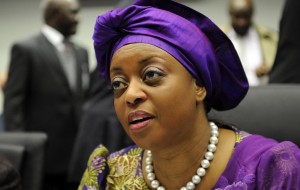
The EFCC alleged that the ex-Minister had stolen the forfeited money from the state oil company. Claims have been made that the former Minister personally diverted up to USD6 billion from the Nigerian Treasury, claims which have yet to be tested in court.
Alison-Madueke, currently in London where she claims to be receiving treatment for cancer, has not unexpectedly denied all allegations of corruption, though she remains the subject of Scotland Yard and National Crime Agency investigations, and has been briefly detained for questioning while in London.
The EFCC also has seized a $37.5m apartment block in Lagos, an $18m mansion in the capital, Abuja, and in collaboration with the NCA in London, is investigating properties in Britain and the United States allegedly bought by Alison-Madueke with stolen government funds.
Judge Muslim Hassan ordered the forfeiture after nobody showed up in court to prove the money was legitimate. It had been held in local naira currency and US dollars in three Nigerian banks. The EFCC announced the judge’s ruling on social media and declared “the former minister is being prosecuted.”
Hundreds of people have been detained and thousands investigated but to date, the commission has yet to successfully prosecute one high-profile case.
In the biggest investigation, security and EFCC agents have detained former national security adviser Sambo Dasuki since December 2015 on charges of misappropriating $2.1 billion meant to buy weapons to fight the Boko Haram Islamic uprising. Dasuki in his defence has said that he acted on the orders of former President Goodluck Jonathan, using the money to bribe party officials to ensure Jonathan won a presidential primary.
Continuing its anti-corruption investigations, the Nigerian Government has announced that it is seizing back one of Africa’s richest oil blocs and could prosecute petroleum giants Shell and Eni in a corruption scandal that has drawn investigators from the United States, Italy, France, Switzerland and Holland.
The Economic and Financial Crimes Commission announced that a Federal High Court has ceded control of Oil Prospecting License 245 to the federal government while it investigates and prosecutes suspects in the “Malabu Oil scam.” The EFCC’s petition says Dutch-British Shell and Italian Agip (now Eni) bought the bloc knowing the transaction was “fraught with fraud” and that the $1.3bn payment to former petroleum minister Dan Etete (Minister of Petroleum during the Sani Abacha regime) and his cronies was a bribe, with the state oil company receiving only $210m from the deal.
While Minister of Petroleum, in 1998 Etete had awarded the offshore block to Malabu Oil, in which it later emerged he had a significant personal stake. A new Nigerian Government withdrew the award to Malabu and later re-awarded it to Shell, in 2011, for which Shell paid USD1.3 billion
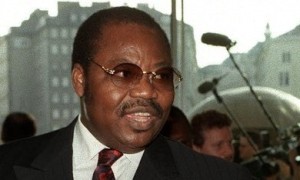
In early 2017, e-mails obtained by anti-corruption groups Global Witness and Finance Uncovered allegedly reveal that Shell executives had been negotiating directly with Dan Etete for a year before the oil deal which corruptly enriched Etete was finalised in 2011.
In March 2017, Nigeria’s anti-graft agency finally filed corruption charges against Shell and Eni over that $1.3bn offshore block deal. The EFCC accused 11 defendants of “official corruption”, according to court documents.
Shell, Eni and Agip, Eni’s Nigerian subsidiary, are alleged to have corruptly given the “aggregate sum of $800m” to Nigerian businessmen and politicians, primarily Dan Etete. Both Shell and Eni deny any wrongdoing. “Eni did not do anything wrong,” said Eni chief executive Claudio Descalzi. “At every stage, we have acted in compliance with all applicable law. Eni and Shell paid the government of Nigeria, and were not involved with the government decision on how to use such money.”
This is the latest probe into the controversial oil deal that highlights endemic corruption within the Nigerian oil sector. Italian prosecutors are also looking into the purchase of the OPL 245 block prospecting license. The Italian prosecution team, led by Fabio de Pasquale, claims that former Minister Etete received 2 payments each of USD400 million, paid through JP Morgan in London
OPL 245 is located in deep offshore waters in the Gulf of Guinea and is estimated to hold at least 9 billion barrels of crude reserves.
The outcome of the case will be closely watched by potential investors in Nigeria, in the hope that transparency will be pursued ruthlessly by the Buhari Administration.


Leave a Reply